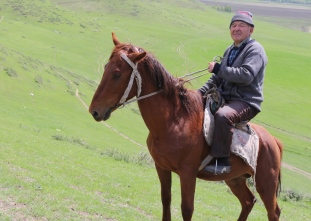
Baigazy Omorov has been raising cattle in the foothills of the eastern Kyrgyz Republic for decades.
His village, Korumdu, is surrounded by thick grass and lush pasture - ideal terrain for raising cows. But the winters are harsh. Once the snow starts falling, his animals are kept inside and fed poorly stored hay, causing milk production to plummet.
But that is changing.
Omorov’s farm is one of seven that are taking part in an advisory project designed to increase yields and improve the quality of milk. As winter fell this year, Omorov's cows were fed a balanced diet with added protein concentrates, vitamins and minerals. Within two weeks, milk production increased over 50 percent.
“It turns out, I had been feeding them wrong the whole the time!” said Omorov, whose family has been raising cattle for generations.
Other pilot farms saw similarly remarkable results.
The initiative is part of a World Bank Group pilot project to develop the dairy sector in Issyuk Kul by addressing gaps along the supply chain. Advisory experts are helping farmers with pasture management, feeding, fodder production, breeding, hygiene, and farm management. Ultimately, the project aims to boost the country’s dairy exports by improving milk production standards and increasing access to finance for farmers and others industry players. That is expected to help spur economic growth in a region with tremendous agricultural potential.
“Thanks to its geographical and climatic conditions, the Kyrgyz Republic has great potential to produce top-quality dairy products, on par Switzerland or New Zealand,” said Mai Nguyen, Program Manager of the Central Asia Agri-Financing Project, which is spearheading the initiative. “But at the moment, it is hard to export even raw milk to neighboring countries because there are so many issues along the supply chain.”
The Central Asia Agri-Financing Project is being implemented by IFC within the WBG’s Finance and Markets Global Practice. The Project is supported with funds from the Austrian Ministry of Finance and Japanese Government.
IFC officials say the project is especially important because it introduces new farming practices to a fiercely traditional area. “One of the project's key achievements to date has been overcoming skepticism among farmers,” said Nguyen. “They saw the results first-hand and now very much trust our experts. They're eager for more advice and closer cooperation.”
That includes Omorov, who was recently preparing to release his cows into their spring pasture.
“I look forward to getting more recommendations from the project’s specialists. They say that during the grazing period, I can increase milk production even more."
There are now plans to engage one hundred business farms in Issyk Kul region and replicate the model across the country in the next two years.
June, 2016